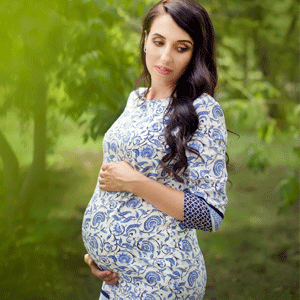
Expectant mothers hit hard with nausea and vomiting in early pregnancy don't need to muddle through debilitating symptoms, new recommendations say.
Drug linked to birth defects
In updating 11-year-old guidelines on treating morning sickness, the American College of Obstetricians and Gynaecologists (ACOG) now suggests women pair vitamin B6 and the antihistamine doxylamine to treat persistent, disruptive nausea and vomiting.The medications are sold separately over-the-counter or combined in prescription form.
Meanwhile, further review of a commonly used morning sickness drug, ondansetron (Zofran), has prompted ACOG to pull back on supporting its use since more recent data suggest the drug may be linked to birth defects.
Read: 7 embarrassing pregnancy symptoms
"I think it's up to each individual patient, in talking with her clinician, to decide what steps they want to take to treat nausea and vomiting," said Dr. Aaron Caughey, a member of ACOG's obstetrics practice committee who co-authored the new guidelines.
"Certainly there are a lot of options that aren't medications per se, such as eating frequent small meals of simple carbs like crackers . . . or avoiding smells that trigger nausea," added Caughey, chairman of obstetrics and gynaecology at Oregon Health and Science University in Portland. "I think it's a conversation between a patient and her clinician whether they want to embark on treatment at all."
About half of all pregnant women experience nausea and vomiting together, while 25 percent have nausea alone, according to the study. Recurrence of these symptoms in subsequent pregnancies ranges from 15 to 81 percent.
Minimising the impact
But for most women, morning sickness does not endanger either them or the foetus. Up to 3 percent of pregnant women represent the extreme end, with nausea and vomiting so severe that hospitalisation may be necessary to replace lost fluids. The reasons for morning sickness are not completely understood.
Read:Anaemia in pregnancy
Reviewing decades of scientific data on morning sickness and its remedies, Caughey and his colleagues noted that its commonness in early pregnancy may lead women and their obstetricians to minimise its impact. Even if a woman doesn't require supplementary intravenous fluids, he said, some find that day-long nausea and vomiting make it difficult to work or fulfill other responsibilities.
Because of the individual nature of pregnancy, the ACOG group decided each woman's perception of her symptoms should play a critical role in deciding whether or when to treat pregnancy-related nausea and vomiting.
One expert agreed with that approach.
"Everybody has their own tolerance and their own experience," said Dr. Matthew Hoffman, vice chairman of obstetrics and gynaecology and the division of education and research at Christiana Care Health System in Wilmington, Delaware.
"Given the safety of the current recommendations, I think that's more than appropriate," added Hoffman, who wasn't part of the ACOG group that authored the guideline. "It's better to get the symptoms under control in advance of people becoming profoundly dehydrated."
Caughey said the guidelines were essentially "tweaked" to recommend the first-line use of doxylamine and vitamin B6 and to demote ondansetron, which the U.S. Food and Drug Administration now recommends not be given intravenously in doses greater than 16 milligrams.
Additionally, pregnancy-related nausea and vomiting should be distinguished from other conditions that could lead to those symptoms, requiring a different approach, the guidelines added.
Caughey and Hoffman pointed out that several "folk remedies" for acute morning sickness including ginger-containing drinks, cookies and other products are still useful options for those who want to try a non-drug approach before trying medications. Taking vitamin B6 on its own also can help, they said.
Read: Allergies and pregnancy
While some women are loath to take any medications during pregnancy, remembering stories of how the drug thalidomide, hailed as a "miracle cure" for morning sickness in the 1960s, maimed thousands of babies holding out isn't necessary if symptoms are profound, obstetricians said.
"I think it's an issue of trying to make sure people aren't muddling through [morning sickness] to the point where they put themselves in danger . . . and to err on the side of considering medications, knowing there's a safe alternative," Hoffman said.
Read more:
Antidepressants during pregnancy have their benefits
Incorrect weight in first pregnancy may have repercussions
Internet safety bigger concern than teen pregnancy
Image: Pregnant woman from Shutterstoock




 Publications
Publications
 Partners
Partners














